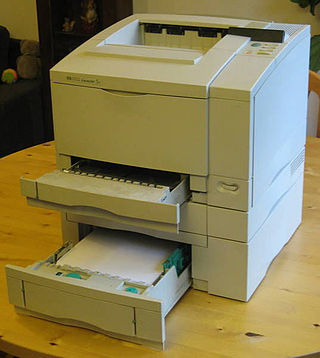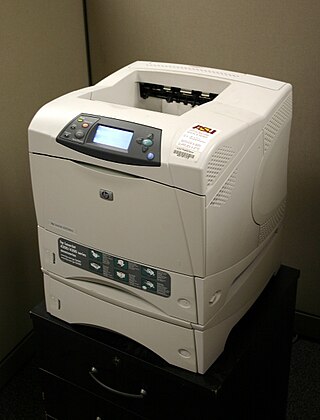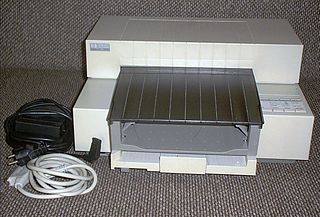
In the field of computing, a printer is considered a peripheral device that serves the purpose of creating a permanent representation of text or graphics, usually on paper. While the majority of outputs produced by printers are readable by humans, there are instances where barcode printers have found a utility beyond this traditional use. Different types of printers are available for use, including inkjet printers, thermal printers, laser printers, and 3D printers.

Laser printing is an electrostatic digital printing process. It produces high-quality text and graphics by repeatedly passing a laser beam back and forth over a negatively charged cylinder called a "drum" to define a differentially charged image. The drum then selectively collects electrically charged powdered ink (toner), and transfers the image to paper, which is then heated to permanently fuse the text, imagery, or both, to the paper. As with digital photocopiers, laser printers employ a xerographic printing process. Laser printing differs from traditional xerography as implemented in analog photocopiers in that in the latter, the image is formed by reflecting light off an existing document onto the exposed drum.

Dot matrix printing, sometimes called impact matrix printing, is a computer printing process in which ink is applied to a surface using a relatively low-resolution dot matrix for layout. Dot matrix printers are a type of impact printer that prints using a fixed number of pins or wires and typically use a print head that moves back and forth or in an up-and-down motion on the page and prints by impact, striking an ink-soaked cloth ribbon against the paper. They were also known as serial dot matrix printers. Unlike typewriters or line printers that use a similar print mechanism, a dot matrix printer can print arbitrary patterns and not just specific characters.

Inkjet printing is a type of computer printing that recreates a digital image by propelling droplets of ink onto paper and plastic substrates. Inkjet printers were the most commonly used type of printer in 2008, and range from small inexpensive consumer models to expensive professional machines. By 2019, laser printers outsold inkjet printers by nearly a 2:1 ratio, 9.6% vs 5.1% of all computer peripherals.

The LaserWriter is a laser printer with built-in PostScript interpreter sold by Apple, Inc. from 1985 to 1988. It was one of the first laser printers available to the mass market. In combination with WYSIWYG publishing software like PageMaker, that operated on top of the graphical user interface of Macintosh computers, the LaserWriter was a key component at the beginning of the desktop publishing revolution.

Daisy wheel printing is an impact printing technology invented in 1970 by Andrew Gabor at Diablo Data Systems. It uses interchangeable pre-formed type elements, each with typically 96 glyphs, to generate high-quality output comparable to premium typewriters such as the IBM Selectric, but two to three times faster. Daisy wheel printing was used in electronic typewriters, word processors and computers from 1972. The daisy wheel is so named because of its resemblance to the daisy flower.
Centronics Data Computer Corporation was an American manufacturer of computer printers, now remembered primarily for the parallel interface that bears its name, the Centronics connector.

The ImageWriter is a product line of dot matrix printers formerly manufactured by Apple Computer, Inc., and designed then to be compatible with their entire line of computers. There were three different models introduced over time, which were popular mostly among Apple II and Macintosh owners.

The Macintosh 512K is a personal computer that was designed, manufactured and sold by Apple Computer from September 1984 to April 1986. It is the first update to the original Macintosh 128K. It was virtually identical to the previous Macintosh, differing primarily in the amount of built-in random-access memory. The increased memory turned the Macintosh into a more business-capable computer and gained the ability to run more software. It is the earliest Macintosh model that can be used as an AppleShare server and, with a bridge Mac, communicate with modern devices.

Deskjet is a brand name for inkjet printers manufactured by Hewlett-Packard. These printers range from small domestic to large industrial models, although the largest models in the range have generally been dubbed DesignJet. The Macintosh-compatible equivalent was branded as the Deskwriter and competed with Apple's StyleWriter, and the all-in-one equivalent is called OfficeJet.

LaserJet as a brand name identifies the line of laser printers marketed by the American computer company Hewlett-Packard (HP). The HP LaserJet was the world's first commercially successful laser printer. Canon supplies both mechanisms and cartridges for most HP laser printers; some larger A3 models use Samsung print engines.

Thermal printing is a digital printing process which produces a printed image by passing paper with a thermochromic coating, commonly known as thermal paper, over a print head consisting of tiny electrically heated elements. The coating turns black in the areas where it is heated, producing an image.
The StyleWriter brand is a line of inkjet serial printers by Apple, targeted mainly towards consumers. They produced print quality that was better than the dot matrix ImageWriters, and were cheaper than the LaserWriters. All but a few models contained Canon print engines, while the last few were re-badged HP Deskjet printers. When Steve Jobs returned to Apple in 1997, he discontinued most of the company's accessory product lines, including the StyleWriter and LaserWriter.
The TallyGenicom brand, acquired by Printronix in 2009, includes laser and line matrix printers, parts, consumables and service. Printronix now owns the intellectual property and worldwide sales distribution rights for TallyGenicom line matrix and laser technologies, including printers, supplies and consumables. TallyGenicom AG retained all intellectual property and worldwide distribution rights for the TallyGenicom serial matrix, inkjet and thermal technologies, including printers and options, supplies and consumables.

A minilab is a small photographic developing and printing system or machine, as opposed to large centralized photo developing labs. Many retail stores use film or digital minilabs to provide on-site photo finishing services.
Printer Command Language, more commonly referred to as PCL, is a page description language (PDL) developed by Hewlett-Packard as a printer protocol and has become a de facto industry standard. Originally developed for early inkjet printers in 1984, PCL has been released in varying levels for thermal, matrix, and page printers. HP-GL/2 and PJL are supported by later versions of PCL.

The Apple Silentype is Apple Computer, Inc.'s first printer, announced in 1979 and released in March 1980 for US$599, shortly after the Apple II Plus. The Silentype's firmware was written by Andy Hertzfeld, who later worked on the Apple Macintosh. The Silentype is a thermal printer, which uses a special paper and provides 80-column output. It was also compatible with the Apple III.
ESC/P, short for Epson Standard Code for Printers and sometimes styled Escape/P, is a printer control language developed by Epson to control computer printers. It was mainly used in dot matrix printers and some inkjet printers, and is still widely used in many receipt thermal printers. During the era of dot matrix printers, it was also used by other manufacturers, sometimes in modified form. At the time, it was a popular mechanism to add formatting to printed text, and was widely supported in software.

The Apple Dot Matrix Printer is a printer that was manufactured by C. Itoh and sold under the Apple Computer, Inc. label in 1982 for the Apple II series, Lisa, and the Apple III. It was succeeded by the ImageWriter in 1984.
Domino Printing Sciences PLC is a British-based developer of Industrial and Commercial inkjet printing, thermal transfer printing, print and apply machines, digital printing presses and laser printing products. At present, they are operating in over 120 countries and employ over 2,800 employees and have manufacturing facilities in the UK, US, China, Germany, India, Sweden and Switzerland. The company's roots are in the industrial printer hardware space, until recently, when they have begun to move into the software space.










































